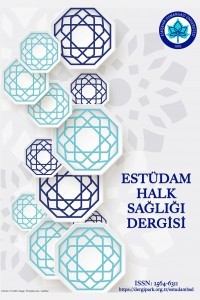
ESTÜDAM Halk Sağlığı Dergisi
Yazarlar: Gülsüm ÖZTÜRK EMİRAL, Burcu IŞIKTEKİN ATALAY, Muhammed Fatih ÖNSÜZ, Aslı Melek ZEYTİN, Yavuz Selim KÜÇÜK, Burhanettin IŞIKLI, Selma METİNTAŞ
Konular:-
Anahtar Kelimeler:Cancer,Colorectal cancer,Screening programs,Awareness
Özet: Objective: The aim of the study is to evaluate the awareness of colorectal cancer screening programs among people aged between 50 and 70 living in semirural area and to perform their screening with fecal occult blood screening test. Material-method: This is a cross-sectional study was conducted among individuals aged 5070 years living in two randomly selected regions (Mahmudiye and Beylikova) from Community Health Centers (CHC) in Eskisehir Osmangazi University Training and Research Area in 2015. From the health records of CHCs, the address information of 1637 people living in the district centers between the ages of 50 and 70 was obtained. At the working day-time, the selected addresses were visited and 1533 people were reached (93.6%). A questionnaire was completed with 495 people (32.3%) who agreed to participate in the study. Those who agreed to have the fecal occult blood screening test were given a test kit describing how to carry out the test. Distributed kits were collected after 48 hours. The samples were evaluated as 'negative', 'positive' and 'invalid' according to the guidelines. The data were evaluated in the IBM SPSS (version 15.0) package program. Chi Square and multiple logistic regression analyzes were used in the analysis of the data. Results: The age of the study group ranged from 50 to 70 years with a mean (standart deviation) of 59.2 (5.8) years. 221 (44.6%) were male, and 450 (90.9%) were married; 295 (82.0%) had primary and lower education level. 177 (35.8%) were aware of hemoccult test among the study group. The frequency of any screening test for colorectal cancer before the study was 19.4% (n = 96) and the participation to the test was higher in women and in patients having physiciandiagnosed chronic diseases. In the study, 113 (22.8%) participants did not want to receive the hemoccult test kit. There was a higher frequency of participation in those who had a higher education level, poor income status, and had colorectal cancer stories in their relatives. Of the 307 participants who received the fecal occult blood screening test kit and were subsequently evaluated, 45 (14.7%) were 'positive'. Conclusion: People who were aware of colorectal cancer screening programs were more likely to participate in screening programs. After being informed about the research, the percentage of people who did not want to participate to the test and even if the kit was given, whose test can not be evaluated was high. This suggests that the community's acceptability of the fecal occult blood screening test is low and its applicability is difficult